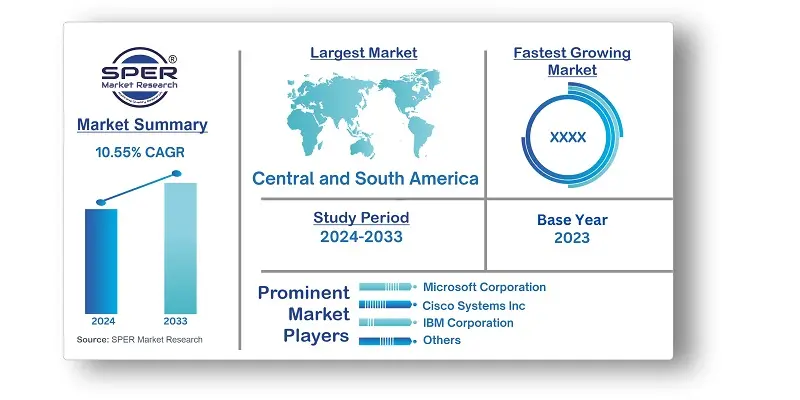
Brazil Cybersecurity Market Growth, Size, Trends, Share, Demand, Revenue and Future Outlook
Brazil Cybersecurity Market Size- By Offering, By Deployment, By End User- Regional Outlook, Competitive Strategies and Segment Forecast to 2033
| Published: Jun-2024 | Report ID: IACT24125 | Pages: 1 - 108 | Formats*: |
| Category : Information & Communications Technology | |||
- In August 2022: Microsoft Corporation introduced Microsoft Defender Threat Intelligence and Microsoft Defender External Attack Surface Management as new security capabilities for tracking threat agent activities. Microsoft Defender Threat Intelligence integrates with existing systems such as Microsoft Defender and Microsoft Sentinel to enable direct access to real-time data created by Microsoft security signals. Microsoft Defender External Attack Surface Management enables security teams to identify unique and unknown resources visible and accessible on the internet.
- July 2022: Microsoft Brazil and the Centre for Public Leadership (CLP) collaborate to teach public sector managers in digital leadership and transformation. The courses aim to reach 44 public managers from various Brazilian states who will be key agents in accelerating the public sector's digital transformation, addressing critical issues such as digital transformation policies beyond Brazil, cybersecurity, virtual counter experience, innovation in the public sector, digital transformation solutions for citizen services, and digital transformation in health, among others.


| Report Metric | Details |
| Market size available for years | 2020-2033 |
| Base year considered | 2023 |
| Forecast period | 2024-2033 |
| Segments covered | By Offering, By Deployment, By End User |
| Regions covered | Eastern Region, Western Region, Southern Region, Northern Region |
| Companies Covered | IBM Corporation, Cisco Systems Inc, Microsoft Corporation, Check Point Software Technologies Ltd, Northrop Grumman, NortonLifeLock Inc, Broadcom Inc, Dell Technologies Inc, Palo Alto Networks Inc, AO Kaspersky Lab. |
- Government Agencies
- Financial Institutions
- Large Enterprises
- Small and Medium-sized Enterprises (SMEs)
- Critical Infrastructure Operators
- Educational Institutions
- Healthcare Providers
- Telecommunications Companies
- E-commerce and Online Businesses
- IT Service Providers
| By Offering: |
|
| By Deployment: |
|
| By End User: |
|
- Brazil Cybersecurity Market Size (FY’2024-FY’2033)
- Overview of Brazil Cybersecurity Market
- Segmentation of Brazil Cybersecurity Market by Offering (Security Type, Services)
- Segmentation of Brazil Cybersecurity Market by Deployment (Cloud, On-premise)
- Segmentation of Brazil Cybersecurity Market by End User (BFSI, Healthcare, Manufacturing, Government and Defense, IT and Telecommunication, and Other)
- Statistical Snap of Brazil Cybersecurity Market
- Expansion Analysis of Brazil Cybersecurity Market
- Problems and Obstacles in Brazil Cybersecurity Market
- Competitive Landscape in the Brazil Cybersecurity Market
- Impact of COVID-19 and Demonetization on Brazil Cybersecurity Market
- Details on Current Investment in Brazil Cybersecurity Market
- Competitive Analysis of Brazil Cybersecurity Market
- Prominent Players in the Brazil Cybersecurity Market
- SWOT Analysis of Brazil Cybersecurity Market
- Brazil Cybersecurity Market Future Outlook and Projections (FY’2024-FY’2033)
- Recommendations from Analyst
1.1. Scope of the report1.2. Market segment analysis
2.1. Research data source
2.1.1. Secondary Data2.1.2. Primary Data2.1.3. SPER’s internal database2.1.4. Premium insight from KOL’s
2.2. Market size estimation
2.2.1. Top-down and Bottom-up approach
2.3. Data triangulation
4.1. Driver, Restraint, Opportunity and Challenges analysis
4.1.1. Drivers4.1.2. Restraints4.1.3. Opportunities4.1.4. Challenges
4.2. COVID-19 Impacts of the Brazil Cybersecurity Market.
5.1. SWOT Analysis
5.1.1. Strengths5.1.2. Weaknesses5.1.3. Opportunities5.1.4. Threats
5.2. PESTEL Analysis
5.2.1. Political Landscape5.2.2. Economic Landscape5.2.3. Social Landscape5.2.4. Technological Landscape5.2.5. Environmental Landscape5.2.6. Legal Landscape
5.3. PORTER’s Five Forces
5.3.1. Bargaining power of suppliers5.3.2. Bargaining power of buyers5.3.3. Threat of Substitute5.3.4. Threat of new entrant5.3.5. Competitive rivalry
5.4. Heat Map Analysis
6.1. Brazil Cybersecurity Market Manufacturing Base Distribution, Sales Area, Product Type6.2. Mergers & Acquisitions, Partnerships, Product Launch, and Collaboration in Brazil Cybersecurity Market
7.1. Brazil Cybersecurity Market Size, Share and Forecast, By Offering, 2020-20267.2. Brazil Cybersecurity Market Size, Share and Forecast, By Offering, 2027-20337.3. Security Type
7.3.1. Cloud Security7.3.2. Data Security7.3.3. Identity Access Management7.3.4. Network Security7.3.5. Consumer Security7.3.6. Infrastructure Protection7.3.7. Others
7.4. Services
8.1. Brazil Cybersecurity Market Size, Share and Forecast, By Deployment, 2020-20268.2. Brazil Cybersecurity Market Size, Share and Forecast, By Deployment, 2027-20338.3. Cloud8.4. On-premise
9.1. Brazil Cybersecurity Market Size, Share and Forecast, By End User, 2020-20269.2. Brazil Cybersecurity Market Size, Share and Forecast, By End User, 2027-20339.3. BFSI9.4. Healthcare9.5. Manufacturing9.6. Government and Defense9.7. IT and Telecommunication9.8. Others
10.1. Brazil Cybersecurity Market Size and Market Share
11.1. Brazil Cybersecurity Market Size and Market Share By Region (2020-2026)11.2. Brazil Cybersecurity Market Size and Market Share By Region (2027-2033)11.3. Eastern Region11.4. Western Region11.5. Southern Region11.6. Northern Region
12.1. IBM Corporation
12.1.1. Company details12.1.2. Financial outlook12.1.3. Product summary12.1.4. Recent developments
12.2. Cisco Systems Inc
12.2.1. Company details12.2.2. Financial outlook12.2.3. Product summary12.2.4. Recent developments
12.3. Microsoft Corporation
12.3.1. Company details12.3.2. Financial outlook12.3.3. Product summary12.3.4. Recent developments
12.4. Check Point Software Technologies Ltd
12.4.1. Company details12.4.2. Financial outlook12.4.3. Product summary12.4.4. Recent developments
12.5. Northrop Grumman
12.5.1. Company details12.5.2. Financial outlook12.5.3. Product summary12.5.4. Recent developments
12.6. NortonLifeLock Inc
12.6.1. Company details12.6.2. Financial outlook12.6.3. Product summary12.6.4. Recent developments
12.7. Broadcom Inc
12.7.1. Company details12.7.2. Financial outlook12.7.3. Product summary12.7.4. Recent developments
12.8. Dell Technologies Inc
12.8.1. Company details12.8.2. Financial outlook12.8.3. Product summary12.8.4. Recent developments
12.9. Palo Alto Networks Inc
12.9.1. Company details12.9.2. Financial outlook12.9.3. Product summary12.9.4. Recent developments
12.10. AO Kaspersky Lab
12.10.1. Company details12.10.2. Financial outlook12.10.3. Product summary12.10.4. Recent developments
12.11. Others
SPER Market Research’s methodology uses great emphasis on primary research to ensure that the market intelligence insights are up to date, reliable and accurate. Primary interviews are done with players involved in each phase of a supply chain to analyze the market forecasting. The secondary research method is used to help you fully understand how the future markets and the spending patterns look likes.
The report is based on in-depth qualitative and quantitative analysis of the Product Market. The quantitative analysis involves the application of various projection and sampling techniques. The qualitative analysis involves primary interviews, surveys, and vendor briefings. The data gathered as a result of these processes are validated through experts opinion. Our research methodology entails an ideal mixture of primary and secondary initiatives.



Frequently Asked Questions About This Report
PLACE AN ORDER
Year End Discount
Sample Report
Pre-Purchase Inquiry
NEED CUSTOMIZATION?
Request CustomizationCALL OR EMAIL US
100% Secure Payment






Related Reports
Our Global Clients
Our data-driven insights have influenced the strategy of 200+ reputed companies across the globe.




















